 Dear Mr President
Dear Mr President
Department of Higher Education and Training: allegations of the Minister’s political interference in the administration
1. I received a number of documents from an unknown source which exposes what appears to be direct interference of the political head of the Department of Higher Education and Training (DHET) i.e. the Minister of Higher Education, Science and Technology, Dr Blade Nzimande, in departmental processes and administration, as well as the active side-lining and/or undermining of the senior departmental accounting officers.
2. Minister Nzimande’s rescinding of DHET/W&RSETA infrastructure support, development and/or upgrades contracts
2.1. On 23 August 2019, the Wholesale and Retail Sector Education and Training Authority (W&RSETA) had sent a request to the National Treasury to retain a surplus of R866,7 million, for the 2017/18 financial year. The money had been earmarked to be utilised, in partnership with the DHET (whilst under the leadership of former Minister of Higher Education and Training Naledi Pandor) for infrastructure support, development and/or upgrades of South Cape College (George Campus) and its Wholesale and Retail Hub and Skills Centre; Sebokeng [Sedibeng] TVET College (Orange Farm) and its Small Business Skills Development Centre; Free State CET College (Reitz, Nketoane); Emfundisi Skills Centre (Alfred Nzo District Municipality); 54 pilot community learning centres; Indlela National Artisan Development Support Centre; as well as the Ntabankulu CET College’s Small Business Skills Development Centre. (See Annexure 1)
2.2. In early October 2019, National Treasury had granted approval for the W&RSETA to retain the cash surplus of R866,7 million. (See Annexure 2)
2.3. On 11 May 2020, the W&RSETA Chief Executive Officer, Mr Blessing Tom Mkhwanazi, wrote directly to Minister Nzimande, requesting his decision to rescind the approval of the aforementioned projects, which Minister Nzimande agreed to do a mere two days later. (see Annexure 3)
The pertinent question here is, in what realm of public administration does a CEO of a Sector Education and Training Authority (SETA) (an official) write directly to a minister (the political head) to decide on the spending of that SETA’s surplus funds?
2.4. Furthermore, we assume that Mr Mkhwanazi then proceeded to write to all the affected institutions as is evidenced by his letter to [Sebokeng] Sedibeng TVET College on 8 June 2020, almost a month later, informing them that the contract between Sedibeng TVET College and the W&RSETA will not be honoured, arguing force majeure and conveniently blaming it all on the Covid-19 pandemic. (see Annexure 4)
2.5. On 9 June 2020, Mr Mkhwanazi wrote directly to Mr Mabuza Ngubane, who is merely the Director SETA Performance Management, but who is said to be a close confidant of Minister Nzimande, to seemingly appeal to him to give the Minister information and to move him to “provide guidance” on a certain matter. (see Annexure 5)
This exchange is extraordinary in itself, but it is far worse considering that the matter directly involved correspondence from the DHET Director-General (DG), but Mr Mkhwanazi thinks nothing of it to write to the DG’s subordinate, because he clearly has a “direct line” to the Minister. So, it would appear from this exchange that Mr Ngubane has been promoted as the de facto DHET DG.
2.6. There is undoubtedly something very improper and unhealthy in the way the Minister dealt with this entire saga. Between Mr Mkhwanazi, Mr Ngubane (and the close relationship is further substantiated in Paragraph 3.1) and the Minister they seem to be personally managing this entire process and the question is, to what end? Why by-pass the entire administrative apparatus that manages the SETAs within the department and, worse still, wilfully and effectively side-line and undermine the most senior DHET accounting officers?
2.7. Not only has this troika deliberately derailed decisions taken by the previous administration and dashed the legitimate expectations of the affected institutions, but they have also established an outcome that seems to be for their own personal, maybe even financial, advantage.
3. Minister Nzimande’s alleged interference in the appointments of SETA boards
3.1. The entire process, of the last round of appointments of SETA board members and chairpersons, had been tainted by direct interference by the Minister, whilst the DHET’s most senior accounting officer ordinarily responsible for this process was totally side-lined. So much so, that the Minister had expressly and directly involved his de facto DG, Mr Ngubane, in the process:
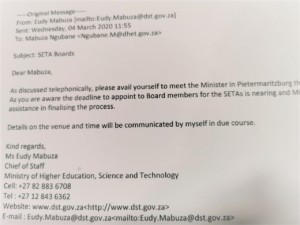

It would be interesting to know if the senior departmental official/s, who are rightfully responsible for this appointment process, had been invited to this meeting with the Minister in Pietermaritzburg, and who had attended.
So entrenched is this personal relationship that, when the Minister called for nominations for the appointment of SETA board chairpersons on 21 January this year, he did not even bother to acknowledge the DHET DG’s role in this process and directed that:


3.2. Another aspect of this seeming ministerial “vanity project” is, when Minister Nzimande directed that the SETAs re-open board nominations after the conclusion of the first round in the latter part of 2019, he knowingly caused the SETAs to waste precious funds. Considering the cost of running these advertisements in the print media, it stands to reason that this “double advertising” exercise cost the SETAs a pretty penny.
3.3. In the end, if all these allegations are true, the process, leading up to the appointment of the current SETA boards, might be found wanting in terms of administrative compliance and the quality control aspects and vetting of nominees by the DHET’s administrative machinery. Should these appointments be challenged in a court of law, this apparent abuse of power and breach of public administrative duties could render these appointments unlawful.
4. Minister Nzimande’s extension of Dr Randall Carolissen’s term at NSFAS
4.1. In early July 2020 I wrote to the Public Protector about allegations of nepotism, victimisation and purging of staff, racism, corruption, general maladministration and mismanagement by Dr Randall Carolissen (NSFAS Administrator) in particular, as well as the general collapse of corporate governance at NSFAS. Worst of all were allegations that the Minister is aware of these issues and is seemingly ignoring them and worse still, is involved in nepotism with the appointment of those loyal to him (including Ms Sibongile Mncwabe – see paragraph 5.2 of this letter) to key NSFAS (and other) positions.
4.2. Minister Nzimande had, just a few days ago, extended Dr Carolissen’s term as NSFAS Administrator (see Annexure 7), much to the chagrin of the National Education, Health and Allied Workers’ Union and the South African Students Congress which echo many of the complaints we lodged with the Public Protector.
4.3. Minister Nzimande seems to be a law unto himself and, given the allegations, his reappointment of Dr Carolissen appears to be either ill-considered, or rather well-considered for reasons known only to himself.
5. Minister Nzimande’s alleged interference in a NSFAS laptop tender
5.2. I am informed that the Minister’s perennial personal advisor and now “Industrial Envoy”, Mr Nqaba Nqandela, and his former office administrator and chief of staff, now NSFAS Chief Corporate Services Officer, Ms Sibongile Mncwabe, flew to Cape Town last week, on NSFAS dime, to view the tender documents as they (therefore presumably the Minister) were allegedly unhappy with the recommended service provider.
5.3. I have also heard that, due to this political interference, the committee has now recommended that the tender be scrapped.
6. From what I have gathered from various sources, and information available in the public domain, Minister Nzimande has a trusty squad of lackeys who accompany him wherever he goes. People like Mr Mabuza Ngubane, Mr Nqaba Nqandela and Ms Sibongile Mncwabe have served in a number of capacities in departments for which Blade Nzimande was appointed as minister.
7. Given the above examples, there is a clear pattern which suggests that Minister Nzimande is ruling his empire with a parallel administrative machinery of hand-picked collaborators, which renders the officials (who will be held accountable for these processes) immobilised, ineffective and in breach of their legally sanctioned duties. I would also imagine that this situation, solely caused by the Minister, has broken trust, and led to a serious drop in morale amongst senior DHET officials, which will invariably cascade down.
8. These kinds of political directives, where ministers wilfully usurp the powers of the departmental accounting officers, could be laced with corruption, and definitely signals a breakdown in discipline and policy continuation.
9. I press upon you, Mr President, that these allegations against Minister Nzimande are serious and warrants your immediate intervention in terms of your stated goal of ridding government of corruption (legally perpetrated or otherwise). You would be well advised to investigate these allegations and to meet with the department’s most senior officials to hear their side of the story.
10. We do however call on you to, in the meantime, suspend Minister Nzimande and his lackeys with immediate effect, until your investigations are completed.
Yours sincerely
Mr Bantu Holomisa, MP
President of the United Democratic Movement




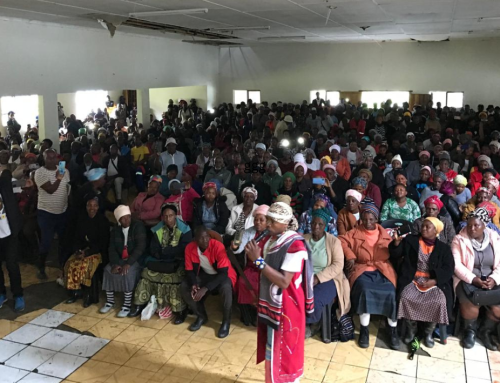




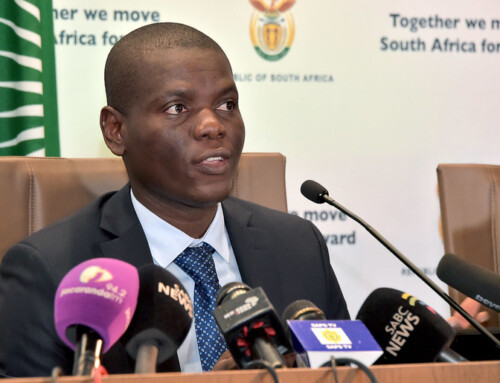





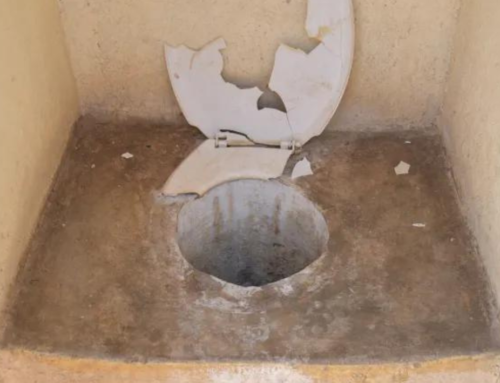

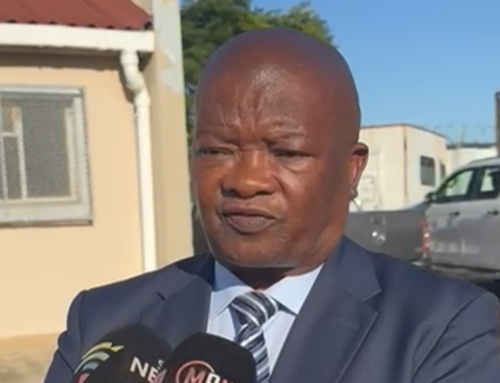



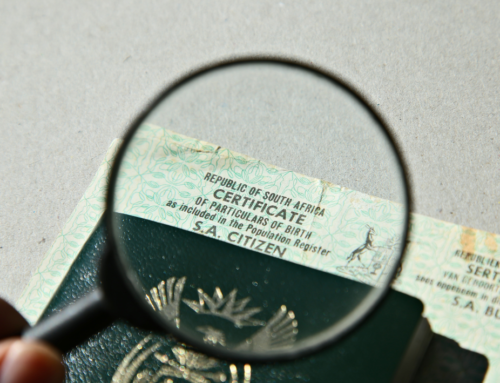







How come ANC members who are involved in corruption are never investigated but Patricia DeLill and Blade Nzimande are focused on? You could’ve focused on Zandile Gumede and Ace Mahashula both ANC.